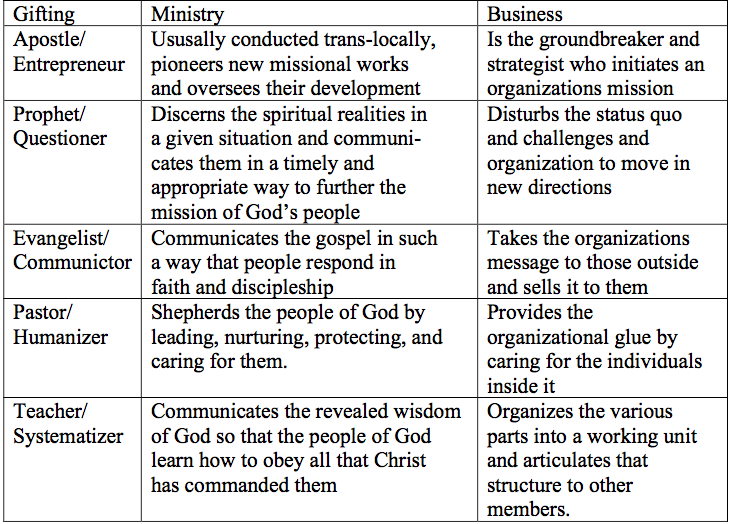Many thinkers and practitioners are examining the role of the five-fold equipping model found in Ephesians 4 as an antidote to hierarchical leadership models of previous generations. In doing so, many are suggesting that not only is this a helpful framework for a way forward in the area of leadership and governance, but it is the most biblically faithful approach to leading and guiding ecclesia at a variety of levels (i.e., local, regional, national, and universal).
In addition, recognition exists that the success of the Christian gospel in a postmodern, pluralistic age will require the full breadth of gifts found in the Ephesians 4 paradigm.
More Is More
As many have commented, the Christendom church, both locally and in its denominational training structures (i.e. seminary), has emphasized and supported the development of the pastoral and teaching gifts as the primary ways of caring for existing congregations. While these gifts and skills are necessary, in an age of risky endeavors and indigenous mission, the gifts of the apostle, prophet, and evangelist are going to be extremely important.
The manifold witness of all of the gifts is imperative to sustaining the other marks of a church network in post-Christendom culture. Furthermore, this development of the five equipping gifts must extend beyond official church clergy and staff to the life of each believer within the congregation. The church will not explode in mission and ministry in our communities unless this occurs.
Development of the 5 equipping gifts must extend beyond official church clergy and staff
Tweet this.
Though other passages list these gifts, the primary location for information on the equipping gifts comes from chapter four of the book of Ephesians. The gravity of these statements for ecclesiological application comes from the fact that Ephesians is a general epistle, meaning that it was not written in response to any specific problem in a particular church. It contains general teaching that would be applicable to a variety of churches in the region to which it was sent. Moreover, Ephesians is commonly regarded as Paul’s most mature teaching on the essential nature of the church.
The chapter begins by drawing the focus toward the essential unity of the church around the Spirit, faith, baptism, lordship (Jesus), and the God and Father of all. Then, Paul moves on to address the diversity and expression of gifting within the church as a result of this essential unity.
But to each one of us grace has been given as Christ apportioned it. . . . It was he who gave some to be apostles, some to be prophets, some to be evangelists, and some to be pastors and teachers, to prepare God’s people for works of service, so that the body of Christ may be built up until we all reach unity in the faith and in the knowledge of the Son of God and become mature, attaining to the whole measure of the fullness of Christ.
Many commentators agree that verse 7 applies to all members of the body of Christ, for there is no reason to assume otherwise in this general teaching on the church.
Furthermore, some scholars point out that the essential nature of the church’s ministry is charismatic in the sense that there is a grace-gifting to all members of the body of Christ. Specifically for this passage, these five gifts are laid out to be the foundational gifts necessary for unity and maturity. Certainly, Paul mentions a host of gifts in other epistles, but these appear to be the essential ones for every church community.
A Necessary Condition for Maturation and Mission
It is important to note that the flow of the text implies that unless these gifts are in operation, maturity will not come. Here is a table courtesy of Alan Hisrch and Michael Frost useful for grasping the functions/roles of the various equipping gifts.
Whether or not it is recognized by those who engage in ministry, all ministry is inherently theological. The manner and scope in which it is performed demonstrates what a person or particular group of people believe or do not believe about God. Emerging generations of leaders are aware of this reality and are less pragmatic in their approach and more oriented towards theological grounding for ministry activity (see Robert Webber, The Younger Evangelicals).
Not only for their essential health, but to garner the interest of those that will lead them, new church networks will need to have a foundational theological basis for their existence and activity. The missio Dei is the fundamental theological orientation for new church networks. It creates the gathering of churches as a community in mission. To accomplish this mission, the full body is essential and must be gifted and active in ministry through the functions of the equipping gifts.



